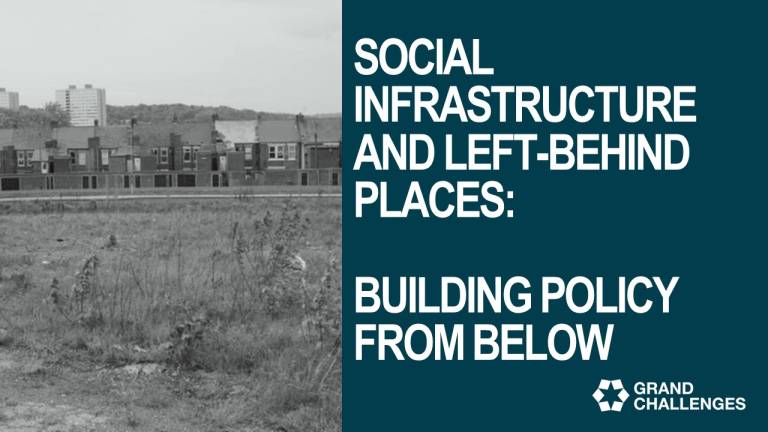Social Infrastructure and Left-Behind Places: building policy from below
7 March 2024
An expert panel examined the making, unmaking and remaking of social infrastructure and set out key tasks for policymakers to tackle this. The full event video is included below.

Addressing the challenges of the UK's ‘left behind places’, has attracted increasing attention from researchers and policymakers. Deficits in ‘social infrastructure’ – ‘the physical places and organisations that shape the way people interact’ – have been identified as a key component in producing left behindness.
In a collaboration between UCL Grand Challenges and UCL Public Policy, the event 'Social Infrastructure and Left-Behind Places: building policy from below' held on 24 January 2024, sought to examine the making of policy 'from below' and set out key challenges as well as opportunities for policymakers. At the event, John Tomaney, Professor of Urban and Regional Planning at UCL, responded to a panel including:
- Sarah Chaytor, Director of Research Strategy & Policy, UCL (Chair)
- Julian Coman, Associate Editor, The Guardian
- Professor Marc Stears, Director, UCL Policy Lab
- Helen Goulden, Chief Executive Officer, The Young Foundation.
Sarah Chaytor chaired the event, and concluded discussions by noting to achieve change in left-behind communities, would require extraordinary action to instil ordinary hope.
Professor Tomaney summarised his findings from the book 'Social Infrastructure and Left Behind Places', which examines the lived experiences of a left-behind place. Through a deep-place study of Sacriston, a former mining village in Durham, the work asks how people feel about where they live. Can understanding attachments to place lead to more meaningful policymaking? The project revealed a constantly changing history of social infrastructure being built, left derelict, reclaimed and transformed, and therefore, attachments to a place are made, unmade and renewed.
Julian Coman brought a view on local nostalgia, which he discussed further in an opinion piece, 'The Guardian view on local nostalgia: a potential community asset'. Coman posed the question what is productive about nostalgia? Noting, nostalgia is a desire which returns to a past that is now outsiders are excluded. Community must be an evolving concept that is flexible to hold space for new and different attachments.
Professor Stears questioned what policymakers need to do to respond to the themes in the book. In conversation, Stears set out three emerging arguments: a move away from grandiosity, a sense of agency from the communities themselves to influence change, and real power lies not in the community skills or transactions, but in their relationships.
Helen Goulden pointed to the work in Sacriston, which was she noted 'simultaneously ordinary but epic'. Social infrastructure should be the foundation of policy agendas as there is evidence that social capital, pride and belonging impacts employment, healthcare and education. Goulden concluded that policymakers should open a dialogue with communities to understand their priorities and the boundaries they face.
The full video of the panel session can be viewed below:
 Close
Close

